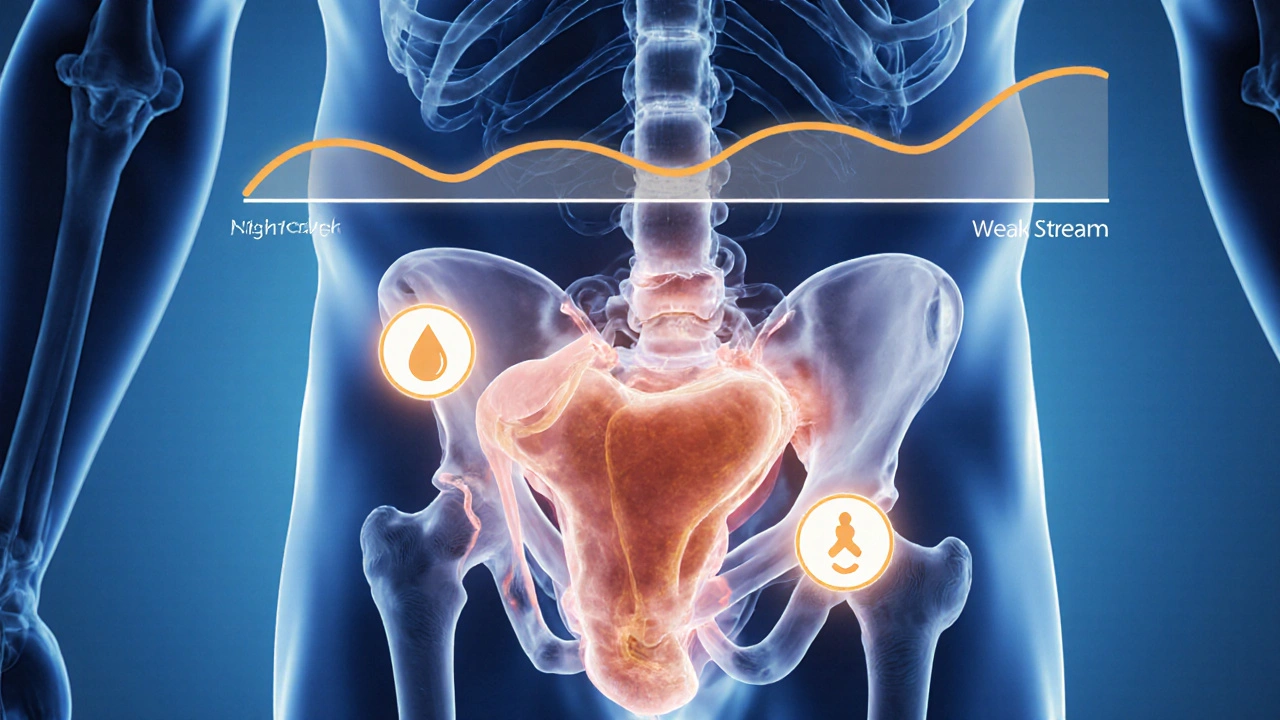Testosterone and BPH: What You Need to Know About the Connection
When you hear testosterone and BPH, the relationship between male hormone levels and prostate enlargement. Also known as benign prostatic hyperplasia, it's a common concern for men over 50, especially those considering testosterone replacement. For years, doctors warned that boosting testosterone could make an enlarged prostate worse. But recent research tells a different story—one that’s simpler and less scary.
Here’s the truth: benign prostatic hyperplasia, a non-cancerous growth of the prostate gland that causes urinary symptoms isn’t caused by high testosterone. In fact, the prostate needs testosterone to grow, but once it’s enlarged, more testosterone doesn’t automatically make it grow more. Studies like those from the New England Journal of Medicine show that men on testosterone therapy don’t have a higher risk of worsening BPH symptoms compared to those who don’t take it. The old fear? Mostly based on outdated assumptions.
What actually drives BPH? Age, genetics, and local hormone conversion—like when testosterone turns into dihydrotestosterone (DHT) inside the prostate. That’s why drugs like finasteride work: they block that conversion. Testosterone therapy doesn’t raise DHT enough in most men to cause trouble. If your prostate is already enlarged, your doctor might still check your PSA and do a simple exam before starting treatment, but that’s just caution—not a red flag.
And if you’re on testosterone and notice new urinary symptoms? Don’t panic. It could be something else—bladder issues, caffeine, or even just aging. Most men on therapy don’t need to stop it. But if symptoms get worse, your doctor can adjust your plan. Maybe add a low-dose alpha blocker, tweak your fluid intake, or check for sleep apnea, which can make nighttime urination worse.
There’s also a bigger picture: testosterone doesn’t just affect your prostate. It helps your energy, mood, muscle mass, and even heart health. Ignoring low testosterone because you’re afraid of BPH might cost you more in the long run. The key isn’t avoiding testosterone—it’s managing it smartly, with regular check-ins and honest conversations with your doctor.
Below, you’ll find real-world guides on how testosterone therapy interacts with other medications, what symptoms to watch for, and how to balance hormone health with prostate safety. No guesswork. No fear-mongering. Just clear, practical info from men who’ve been there.

How Testosterone Levels Influence BPH Symptoms: What Men Need to Know
- Oct, 12 2025
- 12
Explore how testosterone levels affect BPH symptoms, learn to interpret hormone tests, and discover treatment and lifestyle tips for better prostate health.
Categories
- Health and Medicine (62)
- Health and Wellness (56)
- Medicine (37)
- Women's Health (11)
- Mental Health (9)
- Men's Health (7)
- Beauty and Wellness (4)
- Health Information (4)
Archives
- February 2026 (7)
- January 2026 (25)
- December 2025 (28)
- November 2025 (25)
- October 2025 (27)
- September 2025 (14)
- August 2025 (3)
- July 2025 (2)
- June 2025 (2)
- May 2025 (3)
- April 2025 (4)
- March 2025 (4)
- online pharmacy
- medication safety
- dietary supplement
- health benefits
- dietary supplements
- generic drugs
- prevention
- fertility
- online pharmacy Australia
- side effects
- QT prolongation
- medication side effects
- diabetes medications
- GLP-1 agonists
- nocebo effect
- brand vs generic
- treatment
- treatment options
- benefits
- connection
